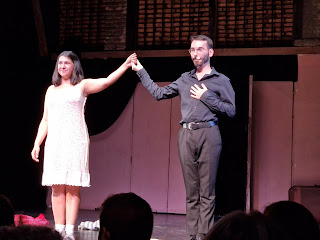Alcalá de Henares, July 12, 2025.
Last year, a new opera festival was created, called the Festival de ópera de cámara de Madrid (Madrid Chamber Opera Festival), or Ópera a Quemarropa (opera at point blank range), in which short-form operas are programmed at various theaters in near small cities around Madrid . Its first edition last year featured Wolf Ferrari's Il segreto di Susanna in Aranjuez, and a medley of songs from Weill's Mahagonny and Seven Deadly Sins in El Escorial. One of the highlights of this year's edition is the Spanish premiere of Grigori Frid's mono-opera, The Diary of Anne Frank , based on the famous diary of the Dutch-Jewish girl who perished in the Holocaust. The venue was the historic Corral de Comedias in Alcalá de Henares, a theater built in 1602, with a capacity for around 200 people, and which retains its classical structure.
Like Anne Frank, and like his compatriot Mieczysław Weinberg, author of another Holocaust opera, The Passenger, Grigori Frid is Jewish. In the late 1960s, Frid read the diary and decided to condense it into a short opera, a one-hour "mono-opera" for soprano and chamber orchestra, composed of 21 scenes. During this time, Frid began experimenting with twelve-tone and atonal music. Although the original libretto is in Russian, a German translation was chosen for its Spanish premiere, as the production comes from the Vienna Musiktheater. Although he composed it with orchestral accompaniment, this time it is performed with piano accompaniment only, as in its Moscow premiere in 1972. The staging is by German director Bruno Berger-Gorski . The musical team features Israelis Miriam Hajiyeva, soprano, and Almog Aharoni, pianist.
On stage, we only see the soprano, dressed as Anne Frank, a chair, and a suitcase. At certain moments, when she fears deportation (which unfortunately eventually occured), she dresses in a coat embroidered with a yellow star with the word "Jood" (Jew) in German, or a striped shirt, typical of concentration camps. The piano is hidden behind the stage, unseen to the audience.
Hajiyeva didn't have an easy task: standing alone on stage for nearly an hour, trying to fill it with her presence and voice. And yet, judging by the final applause and comments heard when leaving the theatre, she seems to have succeeded. She is a lyric soprano, with a youthful and pleasant tone. She successfully conveyed to the audience the innocence, reinforced by her youthful appearance, and the forced growing maturity of her character.
Frid's music, reduced to the piano, has a different impact than it would have with a full orchestra. The score conveys the teenager's different moods, as well as the ambiance of the descriptions of situations or environments, and even her feelings of love toward a boy hiding with the family, Peter van Pels. Although one misses seeing the work as the composer composed it, the piano can also convey all these emotions in a more intimate way, fitting with the small theater: examples can be found when she describes the Gestapo approaching, and especially her feelings toward Peter, and also in the abrupt ending. Pianist Aharoni echoed all of this, playing the score in a way that allows one to appreciate this range of details, making them to serve the protagonist's feelings.
The small theater was almost full. At the end, there was a discussion with the artists and the audience, in which a woman spoke of how wonderful the performance was and how the spirit of Anne Frank was present. Others asked the artists how it was possible to perform Wagner and be Jewish, but the stage director responded with a big true: that many Jews were and are excellent Wagnerians.
The programming of this work was a must. Few operas about this terrible historical period have found their place on the international opera scene, but this short opera by Grigori Frid is on its way to becoming one of them. In fact, this one and The Passenger are the best known, and both come from Russia, expanding its vast operatic repertoire. The theme is universal even today, because in many countries experiencing conflict, and especially in the two major ones which attract the attention of the West—I needn't mention which ones are—there are many Anne Franks who perhaps no longer keep diaries, but instead post stories in social media that show us the horror they cannot escape.
We must thank the Chamber Opera Festival for bringing this opera to Spain, where a work of this nature is so necessary, especially in these times, filled with polarization, prejudice, and violence against those who are different, stemming from every ideology.





No hay comentarios:
Publicar un comentario